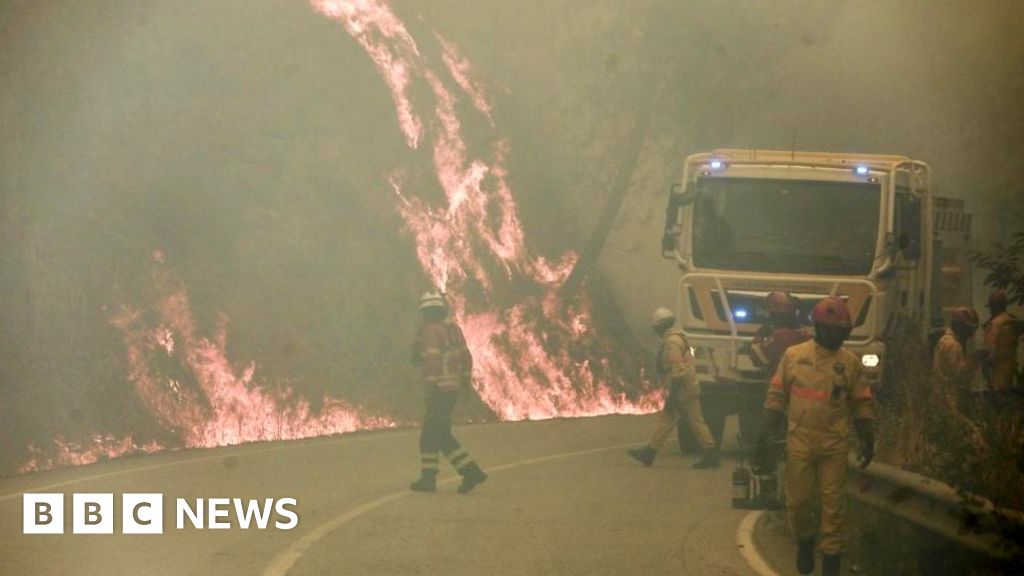
www.bbc.com
Heatwave: Ferocious European heat heads north
As deadly wildfires rage in several European countries, provisional figures show a new UK heat record.
International
Western Europe faces more sweltering temperatures on Tuesday as a ferocious heatwave heads north.
The UK hit its highest ever temperature of 39.1C, according to provisional Met Office figures, with forecasters expecting more than 40C later.
Extreme heat warnings were issued in France while northern Spain saw temperatures of 43C (109F) on Monday.
Deadly wildfires in France, Portugal, Spain and Greece have forced thousands of people to evacuate their homes.
Two people were killed by forest fires in Spain's north-western Zamora region and trains in the area were halted because of fire near the tracks. An elderly couple died while trying to escape fires in northern Portugal.
Several parts of France saw their hottest-ever days with the western city of Nantes recording 42C, the national weather office said.
Wildfires in recent days forced more than 30,000 people to flee, with emergency shelters set up for evacuees. A zoo with 1,000 animals was among the areas evacuated.
Gironde, a popular tourist region in the south-west, has been hit particularly badly, with firefighters from across France battling to control two blazes that have destroyed 19,300 hectares (47,700 acres) of land in the past week. The city of Bordeaux was blanketed by smoke early on Tuesday as the wind changed direction.
"The idea that comes into my head is, it's a monster," said Jean-Luc Gleyze, Gironde's regional president.
"It's a monster like an octopus, and it's growing and growing and growing in the front, in the back, on both sides. Because of the temperature, because of the wind, because of the lack of water in the air... it's a monster and it's very difficult to fight against it."
Temperatures that hovered around 40C on Monday are predicted to drop on Tuesday - but that may not bring immediate relief, as long as dry conditions and changeable winds persist, the BBC's Lucy Williamson reports from Gironde.
The hottest temperatures have now moved to the north and east. Hundreds of people have had to leave their homes in the far north-west of Brittany, and fire has destroyed 1,400 hectares of vegetation.
The UK's Met Office said 39.1°C was provisionally recorded at Charlwood in Surrey on Tuesday, and forecasters warned temperatures could increase, with extreme heat warnings issued covering central, northern and south-east England.
On Monday, the Netherlands recorded its hottest day of the year so far at 33.6C and temperatures were expected to top 39C on Tuesday in some areas.
Forecasters say the heatwave is heading north, with the mercury expected to hit 40C in the far south of Belgium as well as western and southwestern Germany. Germany's DWD weather service recorded a national record temperature of 41.2C in the city of Duisburg in July 2019 and spokesman Andreas Friedrich said similar highs were possible on Tuesday in similar areas along the River Rhine.
In Spain and Portugal, more than 1,000 deaths have been attributed to the heat in recent days. A forest fire in Losacio in the north-west left one firefighter dead on Sunday and the body of a 69-year-old shepherd was found on Monday.
Temperatures in Portugal hit 47C on Thursday - a record for July. Most of the country has been placed under high fire danger by the national meteorological office IPMA.
Several villages were evacuated as a fire spread in the Murça area of northern Portugal, and a man and a woman in their 70s died in their car while trying to flee the flames. Firefighters were fighting the blaze on three fronts and a local mayor said more than 3,000 hectares had been burned. Authorities are anxious to avoid a repeat of 2017, when 66 people were killed in wildfires.''
In Spain, at least 20 fires are burning out of control. A passenger filmed the moment the train he was travelling on came to a temporary halt - as fires raged on both sides of the carriage near the northern border with Portugal.
Heatwaves have become more frequent, more intense, and last longer because of human-induced climate change. The world has already warmed by about 1.1C since the industrial era began and temperatures will keep rising unless governments around the world make steep cuts to emissions.
























































